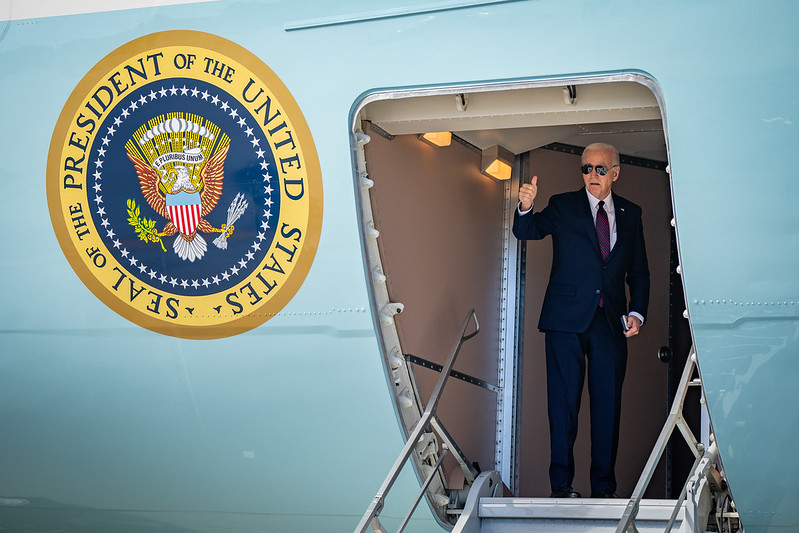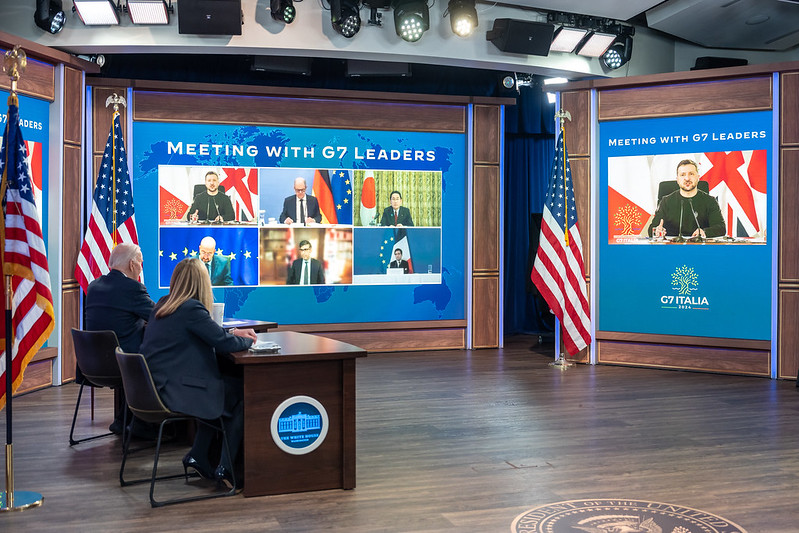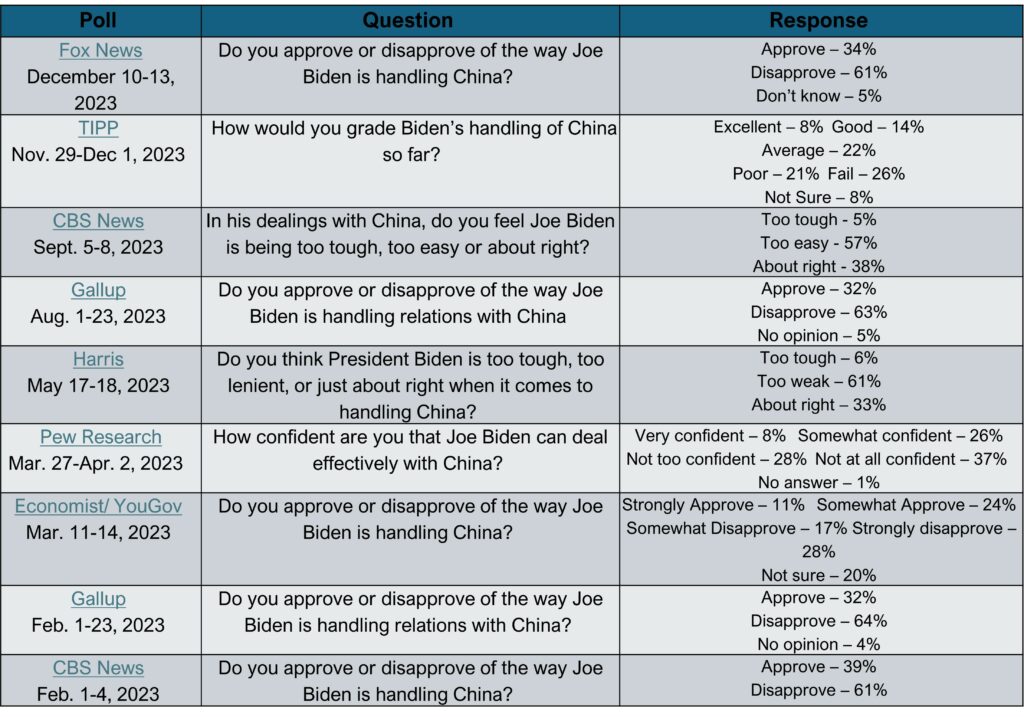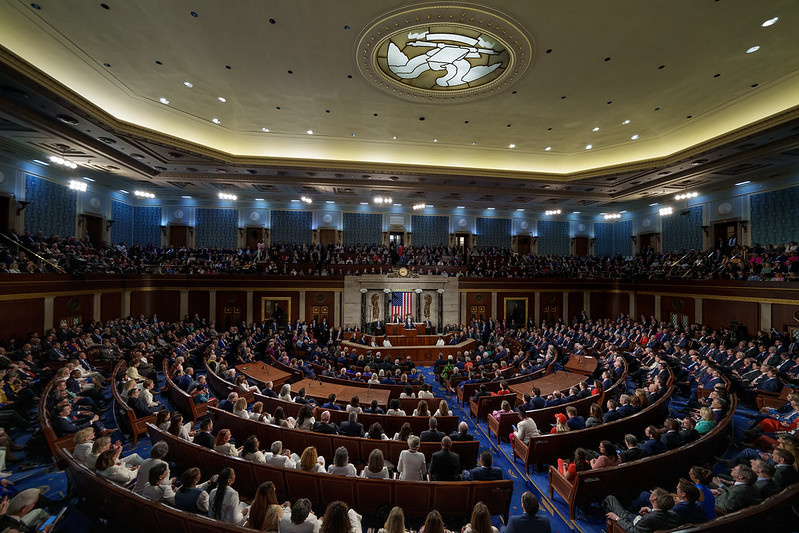EVENTS
Biden’s Handling of China, By the Numbers

Foreign policy is typically not a top issue in national elections in the United States. According to Redfield & Wilton Strategies, between two and four percent of Americans polled in 2020 ranked foreign policy as a key policy area most likely to determine how they would vote. This election year is shaping up to be different. Polls of voters in primary elections and caucuses suggest that foreign policy has become a major concern for the American public. Similarly, US voters support tougher measures on China.
While voters consistently cite immigration and the economy as the most important issues, exit polls from GOP primaries show stronger than usual concern for foreign policy. In South Carolina, 13 percent of Republican voters cited it as their top issue as did 15 percent in New Hampshire in 12 percent in Iowa. In a YouGov poll taken March 3-5, 2024, 88 percent said foreign policy was an important issue for them.
While wide swathes of Americans view foreign policy as important, they are divided on how it should be conducted. In a Wall Street Journal poll from late February 2024 that asked about US support for Ukraine, 36 percent said it was too much, 30 percent answered not enough, and 25 percent said it was “about the right amount.” Views on support for Israel followed the same trend: 30 percent answered too much, 25 percent too little, 32 percent said it was about right.
Voters’ View of China
On China, years of declining favorability among the US public appear to have metastasized into support for tougher measures and more restrictions on engagement. A February 2024 Marist poll found broad support for legislation that restricts China’s access to US markets and removes Chinese telecommunications equipment from critical infrastructure. It also found that the US public is concerned about US assets and investment supporting countries considered to be adversaries, with China named specifically. Across all areas, Republicans expressed the most concern and support for counter measures, but support among Democrats and independents was also well above 50 percent.
Gallup’s poll conducted February 1-20, 2024, further illustrates how much US concerns over China have changed. Americans still view China as the United States’ greatest enemy, especially among Republicans and independents, but this figure decreased from 50 percent in 2023 to 41 percent. Favorable opinions of China increased by five percentage points since last year, reaching 20 percent. Unfavorable views of China, while still high, dropped from 84 percent in 2023 to 77 percent.
Despite these shifts, a majority of Americans – 63 percent – see China’s military power as a critical threat, and 50 percent see a conflict between China and Taiwan as a critical threat. Since 2004, Americans’ view of the threat posed by China’s military power has increased by 24 percentage points while concerns over a conflict with Taiwan have increased by 27 percentage points. While 51 percent of respondents view China’s economic power as a critical threat, this view declined 13 percentage points from last year. In an Economist/YouGov poll conducted March 24-26, 2024, 73 percent described China as an immediate or somewhat serious threat to the United States.
How Much Trouble for Biden?
Like Republican primary voters, Democrats signaled interest in foreign policy albeit in a different way. Sizable numbers of primary voters in Michigan, Minnesota, and Hawaii declined to vote for Biden, instead writing in “uncommitted” to protest the White House’s support for Israel’s response to the October 7, 2023, terrorist attacks.

More than 100,000 Michigan voters opted for “uncommitted” as did more than 45,000 in Minnesota. “Uncommitted” votes made up 29 percent of the final tally in Hawaii’s primary and 7.5 percent in the Washington primary. There was more bad news for Team Biden in the April 2, 2024 primaries. Connecticut voters delivered a 10.5 percent uncommitted verdict, Rhode Island voters delivered an uncommitted tally of 16.5 percent and Wisconsin, which has the highest Muslim population in the United States, cast 8.3 percent for “uninstructed” and 3.1 percent for Dean Phillips, a long-shot candidate with no chance to win, making a total “protest vote” of 11.4 percent.
In Ohio, where neither “uninstructed” nor “uncommitted” were not on the ballot, 13 percent of Democratic voters chose Phillips in the March 19, 2024, primary.
The president’s approval rating on foreign policy hovers between 30 and 40 percent. A February 2024 YouGov survey found 39 percent approval vs. 52 percent disapproval. A February 2024 Harvard/Harris poll found approval at 41 percent while a Monmouth poll in the same month tracked it at 33 percent.
Polls from the past two months show that this trend extends to his approval on specific foreign policy issues, namely Ukraine, Gaza, and China. In February 2024, a Fox News poll showed 31 percent approval for Biden’s handling of the Israel/Hamas conflict while a Harvard/Harris poll cited 38 percent approval. Similarly, a March 2024 ABC News/Ipsos poll found that 30 percent approved of Biden’s handling of the Israel/Hamas conflict while 41 percent approved of his handling of the Ukraine war.
Biden on China
Polls suggest that President Biden’s handling of China could negatively impact his chances for reelection. A TIPP poll conducted from January 31 to February 2, 2024, asked respondents how they would grade Biden’s handling of China: nine percent answered “excellent”, 16 percent “good”, 22 percent “average”, 17 percent “poor”, and 27 percent gave him a failing grade. In the late February Harvard/Harris poll, 19 percent said that Biden’s biggest failure was not doing enough to counter Iran, Russia, and China while the late February 2024 Fox News poll found that 35 percent approved of his handling of China and 61 percent disapproved.
In a poll conducted by Hart Research for CNBC in March 2024, a sample of 1,001 registered voters were asked who did a better job handling China, Trump or Biden. Of those who answered, 33 percent replied Trump versus 17 percent who chose Biden. In six key swing states polled by Redfield & Wilton Strategies in late November 2023, Americans who were polled favor Trump over Biden when it comes to being tough on China – by large margins.
Biden’s own approval ratings and US public opinion of China have been low for most of the administration’s term. The table below shows polling on Biden’s handling of China in 2023.

Biden Takes Aim
The Biden administration seems aware of these issues as it ramps up its reelection campaign. His State of the Union address on March 7, 2024 took aim at both China and Trump. On the former, Biden said that “our trade deficit with China is down to the lowest point in over a decade” while “we’re standing up against China’s unfair economic practices.” In the speech, he also cited technology transfer controls and revitalized partnerships in the Pacific while repeating what has become a common refrain: “We want competition with China, but not conflict.” Citing the technology controls his administration has put in place, he said “…for all his tough talk on China, it never occurred to my predecessor to do that.”

Since the end of February 2024, the administration has taken multiple actions targeting China. As US lawmakers press forward on a ban of TikTok unless it is sold from ByteDance, Biden has said that he would sign a ban should Congress pass it. A Congressional probe into Chinese-built cargo cranes in US ports has raised concerns about security and if components in the cranes could be remotely accessed. The Biden administration has also begun an investigation in Chinese-made electric vehicles which may also contain components that could be used for espionage or otherwise undermine national security.
A Congress Consumed

In the past year, numerous Congressional bills have focused on China. According to Responsible Statecraft, Congressional members introduced 616 pieces of legislation that referenced China in 2023, an average of 3.5 bills for each day Congress was in session during a year in which only 22 bills were signed into law. Many on Capitol Hill see being tough on China as a rare stance that enjoys bipartisan support. In March 2024, the House of Representatives’ Foreign Affairs Committee approved a bill that imposes new conditions on future extensions of the Science and Technology Agreement (STA) between the United States and China, casting into doubt whether the agreement will be extended when it expires on August 27, 2024. (The current six-month extension was first reported by Politico’s Phelim Kine). The STA was the first bilateral agreement between the United States and China and was signed in 1979 by President Jimmy Carter and Vice Premier Deng Xiaoping.
The agreement is now set to expire nine weeks before the presidential election.
Aside from California, China policy has not played a role in local legislative battles. In the Golden State, Democrat Adam Schiff is favored to win the November election for Senate against Republican candidate Steve Garvey. Schiff is under scrutiny for allegedly being in denial over China’s role in the fentanyl crisis. Voters remain unhappy with San Francisco Mayor Londen Breed’s role in handling the APEC meeting in November 2023. City police are said to have refused to investigate attacks on anti-China protests by pro-China groups. Breed’s election chances are not good.
PUBLICATIONS HIGHLIGHTS
Important Milestone
From the Human Rights Journal, a blog offering original analysis and translations related to human rights and rule of law developments in China.

This year Dui Hua hit an important milestone: 500 prisoner lists submitted to the Chinese government. We look back at key metrics, the growth of the Political Prisoner Database, and important achievements in our advocacy.
Dragon Years: Remembrance of Times Past
From the Encounters with China Podcast

Dragon Years: Remembrance of Times Past is a new podcast series that explores key periods of the US-China relationship and John Kamm’s advocacy. Each episode in this five-part series focuses on a different Year of the Dragon, beginning in 1976 and concluding with 2024. As Dui Hua celebrates its 25th anniversary, this podcast captures moments that define Kamm’s work and illuminate the history of the increasingly troubled US-China relationship.
In the inaugural episode, Dui Hua’s John Kamm recounts his early days in China as a trade representative in 1976, the Year of the Fire Dragon, and during the waning days of the Cultural Revolution. He runs afoul of the Gang of Four, publishes the first Western advert in a Chinese publication, and sees a side of China that causes him to change his perspective.
Guangzhou in the Waning Days of the Cultural Revolution
From John Kamm Remembers, a series written by Dui Hua’s founder recounting his advocacy for prisoners in China.

John Kamm began attending trade fairs in mainland China in 1976, an eventful Dragon Year during which China experienced the Tangshan earthquake, death of Mao, and the downfall of the Gang of Four. The young Kamm found himself in the midst of historical events during a period of political upheaval. As his work takes him throughout Guangzhou and the Guangdong province, he sees aspects of Chinese life unknown to those in the West.
Nothing Starts Without a Sale: Learning to Sell in Cultural Revolution China
From John Kamm Remembers.

John Kamm learned salesmanship from his father. This invaluable skill opened China up to John and led to the publication of The Canton Companion, a magazine for foreign businesses that broke new ground during the Cultural Revolution era.
PRISONER UPDATES
Dui Hua’s Prisoner Updates provide the latest information staff researchers have uncovered through online and library research and through direct dialogue with the Chinese government.
Independent filmmaker arrested in Shanghai; Yang Hengjun will not appeal, ex-girlfriend indicted on same charge; Hubei activist detained before provincial “Two Meetings”; Two elderly FLG practitioners granted clemency in Henan; Lawyer still missing in China, daughter passed away in Japan
Australian author sentenced in Beijing; Feminist labor activist sentenced in Shandong; Crackdown on 2019 “Xiamen Gathering” continues; Case of lawyer Yu and wife transferred to Suzhou; Tibetan monk released in Sichuan after completed sentence; Hong Kong Christian detained in Hubei for illegal business operations
